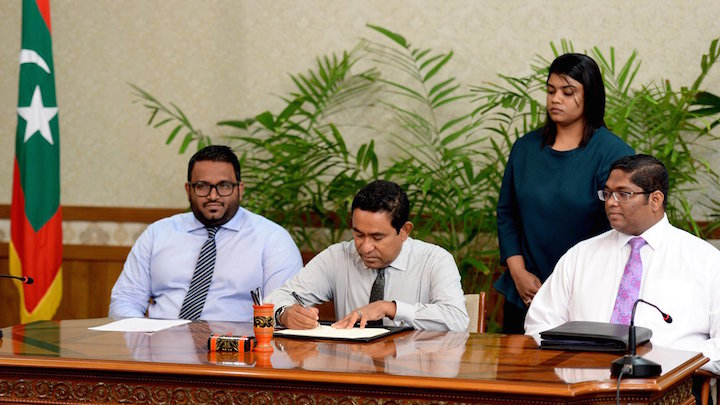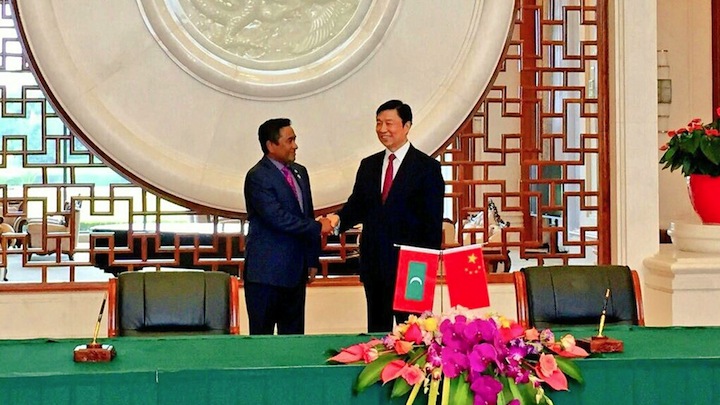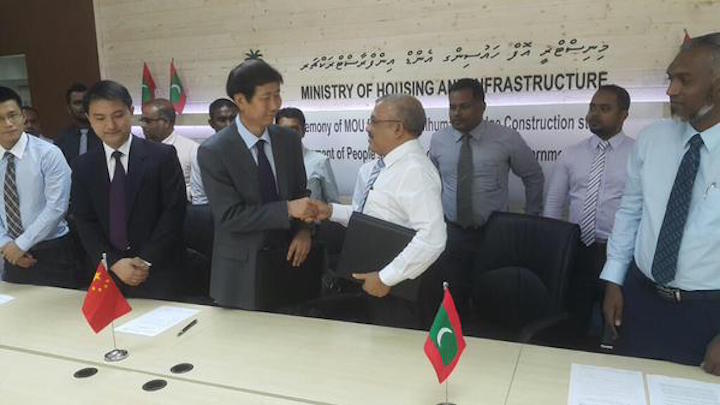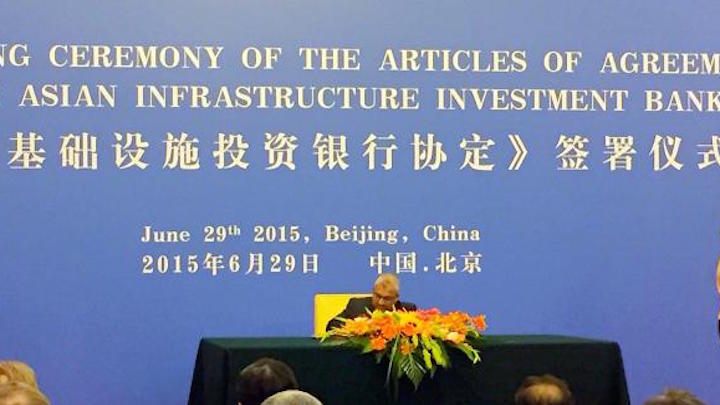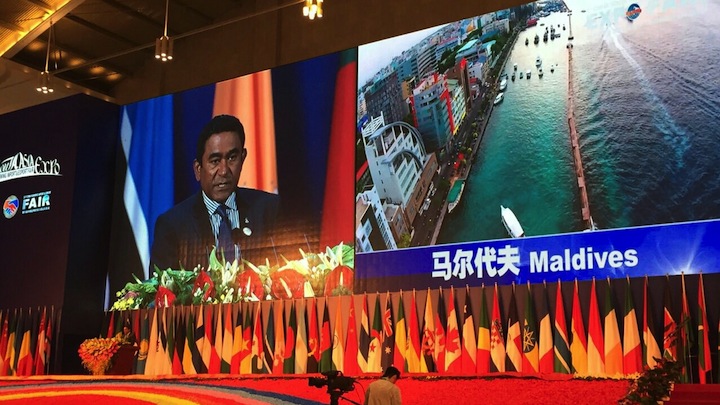President Abdulla Yameen has assured the public that authorising foreign ownership of land or freeholds in the Maldives will not threat Indian Ocean security or lead to “enslavement” and shortage of land.
Addressing the nation this afternoon after ratifying amendments to the constitution passed by the parliament yesterday, Yameen insisted that the unprecedented changes will not adversely affect “friendly relations” with South Asian neighbours.
“The Maldivian government has given assurances to the Indian government and our neighbouring countries as well to keep the Indian Ocean a demilitarised zone,” he said.
The Maldives’ foreign policy will not change as a result of authorising freeholds, he added. The freeholds would not pose “any danger to either the Maldivian people or our neighbouring countries.”
The amendments will allow foreigners who invest more than US$1 billion to own plots of land within the project site. At least 70 percent of the project site must also be reclaimed land.
The second amendment to the 2008 constitution was approved yesterday with 70 votes in favour and 14 against. MPs opposed to the move expressed concern over possible Chinese military expansion in the Maldives and lack of time to debate the amendments.
The main opposition Maldivian Democratic Party (MDP) said the party supports “free ownership of land and property” in principle, but expressed concern with the amendments facilitating “foreign non-commercial logistical installations in the Maldives.”
Speaking to the press after the president’s remarks, newly appointed vice president Ahmed Adeeb said: “We are not going to sell our lands to any country. We are trying to do business here. We want to bring in many corporate investments. We are not going to sell land to other countries, whether its China or Saudi Arabia. We are not gifting our land to other parties. We want to mobilize investments worth at least US$1 billion.”
Attorney General Mohamed Anil stressed that the government will conduct background checks on investors and review if proposed projects may affect geopolitics.
“No cause for concern”
Yameen said there is “no cause for Maldivian citizens to be concerned” with the amendments. Land will only be offered for large-scale economic activities, he stressed, and not “for foreigners to settle in those areas.”
The amendments include “safeguards” such as a requirement for the parliament to approve the projects, Yameen said, and investors will not be able to carry out any other work apart from the authorised project.
The state will exercise complete sovereignty over the areas, he continued, which would also be subject to the Maldivian constitution and laws.
“If the Maldivian state’s sovereign authority is not lost, temples can’t be built there, casinos can’t be built there, and illegal activities cannot be carried out,” he said.
Anil meanwhile noted that the amendments state that the total land area of all project sites must not exceed 10 percent of naturally existing land in the Maldives. The projects will also be regulated by laws passed by the People’s Majlis, he added.
Anil said freehold zones were key in the economic transformation of Dubai, Singapore, and Saudi Arabia. He also said India has a threshold of US$5 million worth of investment.
“The government is not obliged to engage with investors who come with US$1 billion. Of the proposed projects, we will check how feasible they are, what the biggest investments are. And we will also check who the parties are, what their backgrounds are, for Maldives’ security and protection, if this will affect geopolitics,” he said.
“Economic transformation”
Yameen said the amendments will “speed up the pace” of realising the current administration’s goal of “transforming the economy,” which could not be achieved by continuing with “business as usual.”
The US$1 billion will not be spent entirely on land reclamation, Yameen said, but on infrastructure development such as new “townships,” airports, marinas, and seaports.
Adeeb meanwhile told the press that the amendments were in line with the ruling Progressive Party of Maldives’ (PPM) economic agenda. It accompanies the government’s flagship special economic zones (SEZ) legislation and the introduction of corporate residence visas.
Responding to allegations that the SEZ legislation had failed, Adeeb said the government has received several SEZ proposals from potential investors, but the government could not accept some as some investors made demands such as complete exclusivity for 25 years.
The government is negotiating “the best deal” for the country and seeking “win-win situations”, Adeeb said, reiterating that one ‘mega project’ could transform the economy.
The government will not allow illegal activities such as weapons smuggling, money laundering, or gambling, he said.
“We do not want to bring in companies with bad reputations to launder money. We are talking about Fortune 500 companies,” he said.
Land reclamation
Yameen meanwhile sought to allay fears of “running out of land for future generations.”
The government is not planning on offering all the islands and lagoons in the Maldives for sale, he said, adding that the government will only authorise “one or two projects” that would create jobs for youth and increase national wealth.
The Maldives has the capacity to significantly increase its territory by reclaiming land in large shallow lagoons, he said, and the cabinet’s economic council has approved funds for the state-owned Maldives Transport and Contracting Company (MTCC) to procure a cutter dredger.
Yameen said 24 million square meters of land could be reclaimed from the lagoon of Laamu Maavah for about US$200 million, 45 million square meters could be reclaimed from the Vaavu Bodumohora lagoon for about US$160 million, and 16 million square meters could be reclaimed from the Thaa Hirilandhoo lagoon for US$50 million.
Once the MTCC dredger arrives next years, Yameen said the government will have the capacity and the financial means to carry out the projects.
There is no danger of running out of land in the next 50 or 100 years, he said.
Population consolidation is also a policy of the current administration, Yameen continued, urging youth from small islands to migrate to the capital.
Once phase two of the Hulhumalé development is complete and the government authorises high-rise buildings to 20 or 25 floors, Yameen said up to 70 percent of Maldivian population could be settled in the Malé region.
Yameen said the constitutional amendments were proposed following long deliberation, research, and consultation with foreign parties and legal experts.
